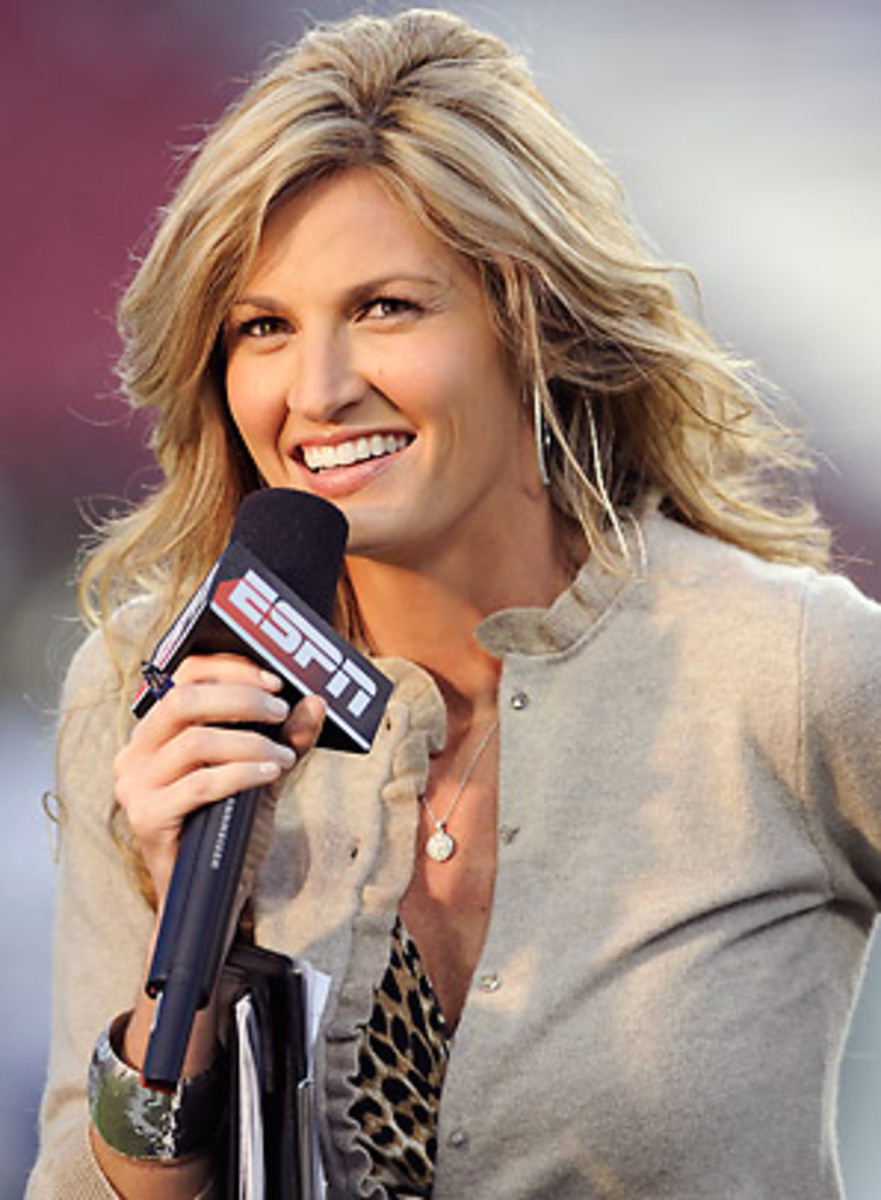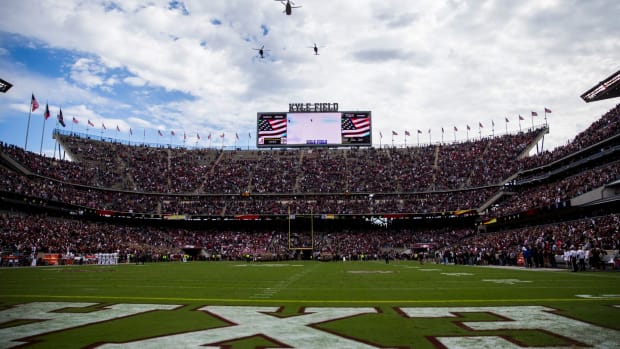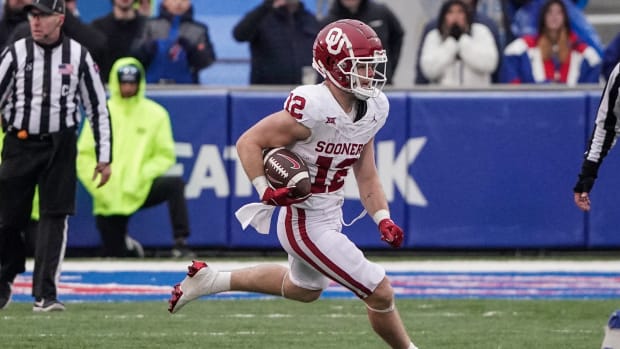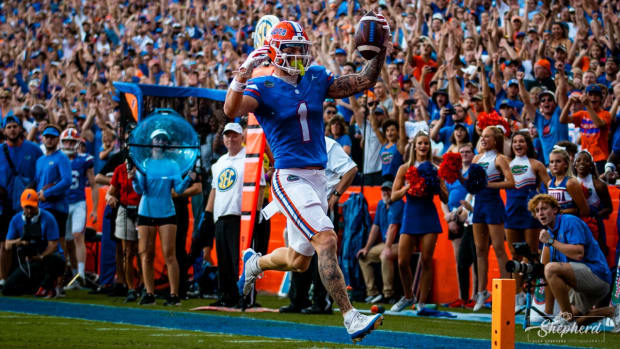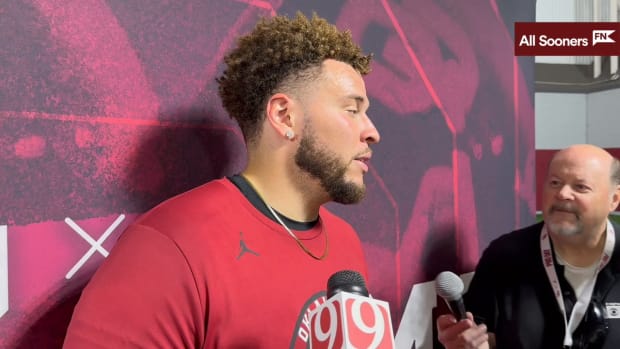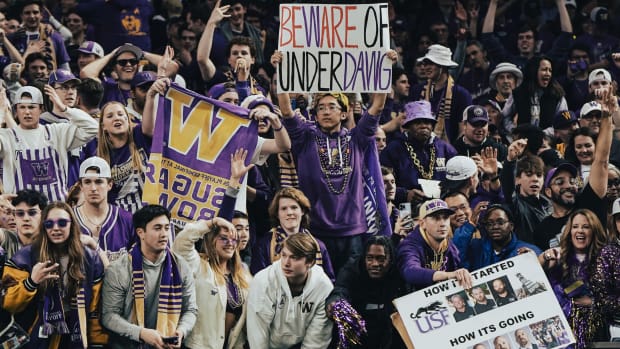College football TV roundtable
Few sports evoke passion the way college football does, especially when it comes to opinions on announcers and the networks that employ them. For the second consecutive year, our college football team joined me for a panel on a number of television topics. Thankfully, they weren't shy:
Stewart Mandel: As readers can probably figure out, I'll watch any game Joe Tessitore is calling because it's likely to end in crazy fashion. Brent Musburger seems to only get cooler with age, and he's paired with the most informative color guy out there, Kirk Herbstreit. Verne Lundquist is slow on the draw, and Gary Danielson will drive you nuts with his SEC pom-poms, but their CBS games are still such great theater. Rece Davis is a consummate pro and truly passionate about the sport. Chris Spielman and Todd Blackledge are also excellent color guys.
Holly Anderson: Lundquist is my sentimental favorite. His voice has become so inextricably linked with fall Saturdays in my head that it's almost jarring to hear him calling March Madness games. His chortle is one of America's greatest aural treasures. But no announcing team made a greater leap toward becoming appointment viewing on its own merit more than Tessitore and Rod Gilmore last season. You might think it a series of coincidences that the two were at the helm of everything from the Baylor-TCU tilt in Week 1 to San Jose State-Hawaii in mid-October to Iowa State's double overtime late-season upset of Oklahoma State in 2011. The Internet calls it The Tessitore Effect. (We're crediting Tessitore and not Gilmore with these unearthly powers thanks to that one week Tessitore took off in November to cover the Breeders' Cup. Gilmore handled the Friday night USC-Colorado game with Dave Lamont instead, and though the Buffs scored first, the Trojans put up 21 points in the second quarter and went on to win 42-17.) ESPN announced Monday that the GilTess crew would be split up. (I'm calling it that because a colleague likened this split to a heart-rending celebrity breakup. This is absolutely what it must feel like to be a Twilight devotee, only way more age-appropriate.) And though it's hard not to be happy for Tessitore gaining a higher profile with a Saturday assignment, the late Friday slot will not be quite so glorious this season. It's not just the games they ended up in front of that made Tessitore-Gilmore such compelling television, but how they did it. It was like watching with extremely knowledgeable friends, which is a perfect timbre to set for the Friday games, and it also meant they weren't above getting a little giddy and letting some true glee for the game show when the action on the field warranted it.
Andy Staples: Tessitore's mere presence makes wackiness happen. When I walked into the press box at Iowa State's Jack Trice Stadium last Nov. 18 and saw Tessitore, I knew I had chosen the correct game. Sure enough, the Cyclones shocked Oklahoma State. That game was the first in a double-header for each of us. He had Oklahoma-Baylor the next night, and I had Nebraska-Michigan the following afternoon. I should have scrapped my plans and just followed Tess to Waco. Besides his supernatural ability to enhance the drama of a game, Tessitore is one of the most prepared, dedicated guys out there. He watches video of his games the way a linebacker would go over film -- with a critical eye and a determination to make the next call/game better. My favorite announcing team at ESPN has been Pasch and Chris Spielman. They've been teamed with a third (Bob Greise or Urban Meyer), but they would work great as a duo. Pasch lets the action do most of the talking and keeps the narrative flowing, and Spielman is that rare great player who also makes a great analyst. He sees things other analysts miss, and he translates the X-and-O patois into a language the average viewer can understand without dumbing anything down.
.
Richard Deitsch: Let's start with the big dogs: Herbstreit and Musburger possess terrific chemistry and both deal viewers straight regarding play on the field, even with Brent's tendency to overhype an event for all the Tostitos. College GameDay ranks with TNT's Inside The NBA as the best in class for a studio show and has improved because Desmond Howard has improved. Eventually, Lee Corso will retire and that's going to be an interesting personnel change given the show's chemistry. Do they bring in another voice? I want more of Ed Cunningham, Charles Davis, Rece Davis, Gillmore, McDonough, Beth Mowins, Pasch, Dave Revsine, and Tessitore because good work deserves light. Rece Davis, by the way, is a remarkable talent, one of the most competent broadcasters at ESPN. He makes some of the Lou Holtz-Mark May dreck tolerable and for that alone he should be awarded a Sports Emmy. I'm generally fine with a Lundquist-Danielson broadcast, though I know there's a contingent of viewers who can't tolerate Danielson's rah-rah-rah-ing of all things SEC. I like ESPN's David Pollack. He's developing into a good broadcaster and seeing him instead of Craig James on Thursday night means I now know what Berliners felt when the Wall came down.
Mandel: Fortunately the least appealing announcer of recent past has moved on to a career in political irrelevancy. I don't understand how Mike Patrick keeps getting such plum assignments; he is so shrill and over-the-top. ESPN has tried really hard to make a star out of Jesse Palmer but I don't see it; his analysis is usually pretty superficial. And I hate to say it, but Gus Johnson was fairly disappointing during his first year in the college football world; maybe another year and bigger games (Fox primetime) will bring out the March Madness Gus.
Anderson: The one downside -- and there is only one -- to James' departure from ESPN is the loss of an automatic answer to this question. All the remaining annoyances on broadcast teams just seem so quibbling by comparison. (Sincere congratulations to Rece Davis, who deserves far, far better than any of the booth partners he endured last season, for surviving this long without pitching himself out a stadium window.) There is one announcer who can make me actively uncomfortable, but it's not for a good reason at all: Danielson is a skilled analyst, but when he becomes disappointed in a player's or team's performance he can develop this tone that sounds uncannily like my dad giving the "I'm very, very disappointed in you" speech. It affects my anxiety levels to a degree that shouldn't really be possible.
Staples: James is gone, so I'm pretty good with everyone else.
Deitsch: I'm going to miss James this year in much the same way I miss having my wisdom teeth extracted. Let's note that James left on his own accord after eight years of torturing ABC/ESPN viewers; this wasn't ESPN management making the call. As we move past the spectacularly unsuccessful Senate candidate from Real Street, we'll start with Holtz. The former Notre Dame coach is inexplicably given serious airtime at ESPN, yet rarely makes a salient point. And he's another in the Dick Vitale-mode who Gods up coaches. (We'll hit that topic later on.) Mandel is right about Patrick, and the next time Jenn Brown asks a challenging question of a coach will be the first time. She continues not to distinguish herself as a sideline reporter on major games. It's going to be hard to forget Millen's analysis of Penn State and the Freeh Report when I hear him in the booth. (Naturally, ESPN has promoted him to a primetime game.) Like I said last year: I'm not part of the cult of Gus Johnson when it comes to college football. That's not a knock, but he doesn't distinguish himself beyond the others. Will Gus be the home run on college football Fox thinks he is? I'll predict the longterm answer is no, but we'll see.
Mandel: ESPN will be fine, but I don't see how it could be better off losing Andrews (though it's great that rising star Samantha Steele is getting a bigger role). Fox gains by adding an extremely popular college football personality in a year it's taking on a much bigger spot in the marketplace. Its talent was pretty drab before, and even the two guys it's pairing her with, Eddie George and Joey Harrington, are not broadcasting superstars, so she's the draw for that studio show. It gives us something to turn to when May and Holtz enter unbearable mode (usually when Notre Dame comes up).
Anderson: Probably Fox, if anyone. Andrews was a very capable sideline presence for ESPN, but I can't imagine any network gaining or losing a significant number of viewers based on the presence or absence of a single reporter. Meanwhile, Fox gets an automatic publicity bump for a new show on its schedule because it's Andrews' show. Even if some folks are tuning in early merely out of curiosity, that's still butts in seats, so to speak.
Staples: They both made out well in their own way. ESPN's executives had decided where they felt Andrews' ceiling was, and now she gets a chance to prove them wrong (or right) as the host of Fox's pregame coverage. ESPN, because it is so much bigger than every other sports broadcasting entity, doesn't have to retain all its stars because it can create new ones. Those people must have the underlying talent to connect with the viewership, but they don't have to come in with a huge name. Just wait. In a year, Steele -- who showed off such a big arm during pregame of last year's Texas-Oklahoma game that we joked the Longhorns should start her at quarterback -- will be a household name.
Deitsch: Both, but it comes with a caveat: Fox is gambling that Andrews can run a studio show and maintain an audience over the course of a season. She's a boldfaced name in college football and what Fox had here before was a train wreck. I imagine Andrews can carry the logistics of a studio show but can she (or is she willing to) take a stand against coaches when needed? Can she lead analysts George and Harrington -- the jury is out on both of these guys -- into interesting discussions that aren't always comfortable? I fear that this will become just another run-of-the-mill Fox Sports chuckle-fest, but we'll know the answer after the first six or seven weeks. For ESPN, nothing changes. Steele replaces Andrews, and ESPN won't lose a single viewer from her departure. Its hype-happy PR staff is already blasting out releases on Steele. The Empire moves on.
Mandel: If and when the SEC starts its own network, that. The fans are rabid, they're everywhere and half the schools can theoretically be national title contenders in a given year. The Big Ten Network is already fairly well established, though I don't know how many non-Big Ten fans tune in for most of their games. I think the Pac-12 Networks will serve their purpose -- getting the league more exposure, in particular for its basketball and Olympic sports -- but I'm not sure it will be a national hit because the league only really has two national programs (USC and Oregon) in football.
Anderson: The Pac-12 Networks haven't even launched yet, but that's the one that most excites me thanks to the conference's stated commitment to a thick blanket of coverage and heavy attention to streaming, tablet and mobile technology. Bringing in all the member institutions for content creation through the Pac-12 Digital Network is an inspired move. If they pull it all off, what the Pac-12 is doing should serve as the model for any sports league serious about serving its fan base across all available platforms.
Staples: The Big Ten Network is already pretty much national. The Pac-12 Networks will be interesting because they'll be hyperlocalizing depending on the cable system to better serve fans of the schools in certain areas. When the SEC starts its own network -- which will be a partnership with ESPN -- it likely will gain the most traction simply because the SEC is the league most fans watch when they aren't watching their own conference.
Deitsch: The answer is none, because each is a regional network at the core. But if forced to chose, I'd go with the SEC Network if it happens, simply because of the power of the football teams in that conference. The Big Ten Network has a huge alumni base and the Midwest will tune in, but I don't see that as a national player. The network also revealed a lot about its independence and news judgment with how it handled the Penn State story. The Pac-12 Networks will draw interest in the West and Larry Scott is a bright guy who will push digital initiative. But as Mandel said, there's little interest out East in the programs beyond USC.
Mandel: When I'm covering a game in the press box, I often have the GameCast open on my computer, and I know a lot of fans watching on TV do as well. Why? We want to know how many yards Andrew Luck has thrown for through three quarters, or Oregon's rushing yards per play. TV broadcasts tend to only give you those things in increments -- either at halftime, or maybe late in the game if a broadcaster mentions something before a play. It seems to me networks could be rotating through a constant series of graphics at the bottom or in the corner, much like the NFL does on Sundays. Just because fantasy football isn't mainstream for colleges doesn't mean fans don't care about the stats.
Anderson: Huge expansions, across every television network, in on-demand availability of full college football games. The sheer volume of televised games is far outpacing the simultaneous recording capacity of home DVRs, and a Sunday spent watching action we missed on Saturday would further line the pockets of conferences and television companies and keep a grateful nation of die-hards from having to actually interact with their loved ones at any point during the weekend.
Staples: This concept is almost a thing of the past, but I'd like it to get euthanized immediately. No more split telecasts. Dear networks, you didn't pay all that money for football games to not show them to people. If you bought a game, find an exclusive feed for it. There are a million channels now. We shouldn't be worrying about what percentage of the country is seeing Wisconsin-Michigan State. Split telecasts are the slightly-smarter-but-that-isn't-saying-much cousin of tape delay, and it's time we put both out of their misery.
Deitsch: I've been thinking a lot about the mythologizing of college football coaches in the wake of the Penn State scandal. Throughout the sport we see coaches enabled by broadcasters -- especially former players-turned-analysts -- and such deification is dangerous. Television is the worst culprit here, with print and online press accomplices as well. What I'd like to see changed -- and it will take some thoughtful adults in charge to do it -- is a fundamental shift in the language that broadcasters use about coaches. Enough with the over-the-top glorifying of coaching figures that led us down the JoePa Highway. Let's be better than that.
